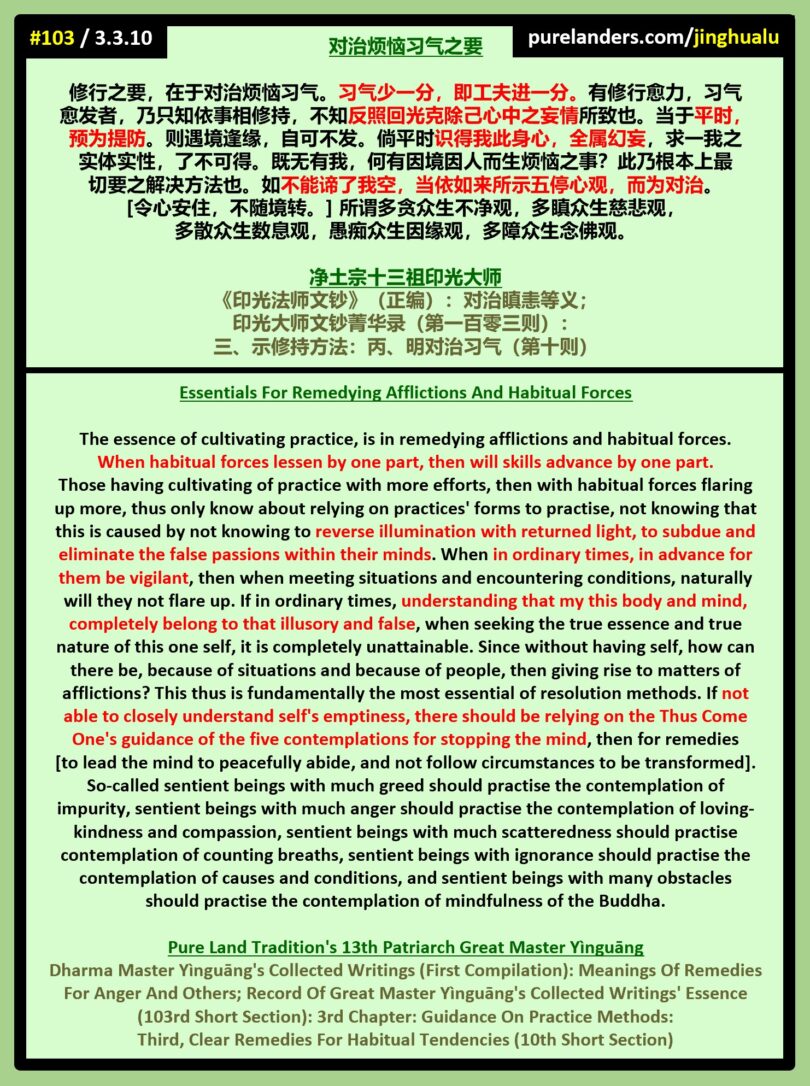对治烦恼习气之要
[103] Essentials For Remedying Afflictions [And] Habitual Forces
修行之要,在于对治烦恼习气。习气少一分,即工夫进一分。
[The] essence of cultivating practice, is in remedying afflictions [and] habitual forces. [When] habitual forces lessen [by] one part, then [will] skills advance [by] one part.
有修行愈力,习气愈发者,乃只知依事相修持,不知反照回光克除己心中之妄情所致也。当于平时,预为提防。则遇境逢缘,自可不发。
Those having cultivating [of] practice [with] more efforts, [then with] habitual forces flaring up more, thus only know [about] relying [on] practices’ forms [to] practise, not knowing that [this is] caused [by] not knowing [to] reverse illumination [with] returned light, [to] subdue [and] eliminate [the] false passions within [their] minds. When in ordinary times, in advance [for them] be vigilant, then [when] meeting situations [and] encountering conditions, naturally will [they] not flare up.
倘平时识得我此身心,全属幻妄,求一我之实体实性,了不可得。既无有我,何有因境因人而生烦恼之事?此乃根本上最切要之解决方法也。
If [in] ordinary times, understanding [that] my this body [and] mind, completely belong [to that] illusory [and] false, [when] seeking [the] true essence [and] true nature [of this] one self, [it is] completely unattainable. Since without having self, how [can there] be, because [of] situations [and] because [of] people, then giving rise [to] matters of afflictions? This thus [is] fundamentally [the] most essential of resolution methods.
如不能谛了我空,当依如来所示五停心观,而为对治。
If not able [to] closely understand self’s emptiness, [there] should [be] relying [on the] Thus Come [One’s] guidance [of the] five contemplations [for] stopping [the] mind, then for remedies.
(五停心者,以此五法,调停其心,令心安住,不随境转也。)
(Those five [contemplations for] stopping [the] mind, [are] with these five methods, [for] harmonising [and] stopping your mind, [to] lead [the] mind [to] peacefully abide, [and] not follow circumstances [to be] transformed.)
[Note: The Five Contemplations For Stopping The Mind (五停心观) are the (1) contemplation of impurity (不净观), (2) contemplation of loving-kindness and compassion (慈悲观), (3) contemplation of causes and conditions (因缘观), (4) contemplation of mindfulness of the Buddha (念佛观) and (5) contemplation of counting breaths (数息观).]
所谓多贪众生不净观,多瞋众生慈悲观,多散众生数息观,愚痴众生因缘观,多障众生念佛观。
So-called sentient beings [with] much greed [should practise the] contemplation [of] impurity, sentient beings [with] much anger [should practise the] contemplation [of] loving-kindness [and] compassion, sentient beings [with] much scatteredness [should practise] contemplation [of] counting breaths, sentient beings [with] ignorance [should practise the] contemplation [of] causes [and] conditions, [and] sentient beings [with] many obstacles [should practise the] contemplation [of] mindfulness [of the] Buddha.
净土宗十三祖印光大师
Pure Land Tradition’s 13th Patriarch Great Master Yìnguāng
《印光法师文钞》(正编):对治瞋恚等义;
Dharma Master Yìnguāng’s Collected Writings (First Compilation): Meanings [Of] Remedies [For] Anger [And] Others;
印光大师文钞菁华录(第一百l零三则):三、示修持方法:丙、明对治习气(第十则)
Record [Of] Great Master Yìnguāng’s Collected Writings’ Essence (103rd Short Section): 3rd [Chapter]: Guidance [On] Practice Methods: Third, Clear Remedies [For] Habitual Tendencies (10th Short Section)
[Ref: #103 / 3.3.10]
Namo Amituofo : Translation and note by Shen Shi’an
下一部分
Next Part:
提防财色横逆之烦恼
[104] Guard Against Afflictions Of Wealth, Sex And Violent Opposition
https://purelanders.com/2025/02/06/104-guard-against-afflictions-of-wealth-sex-and-violent-opposition
上一部分
Previous Part:
返照回光之妙法
[102] Wonderful Methods Of Inward Illumination With Returned Light
https://purelanders.com/2023/07/11/102-wonderful-methods-of-inward-illumination-with-returned-light
完整典籍
Complete Text:
《印光大师文钞菁华录》
Record Of Great Master Yìnguāng’s Collected Writings’ Essence
https://purelanders.com/jinghualu




